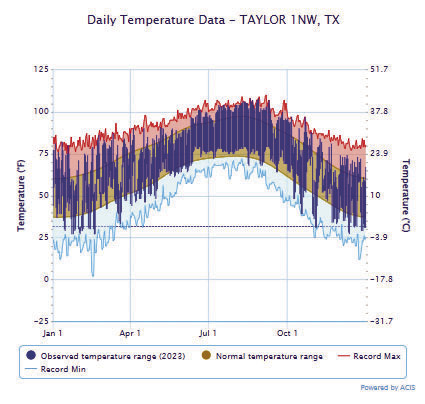HUNTER DWORACZYK [email protected]
While the new year already has a handful of days on the books, 2023 officially was a record year.
According to the National Oceanic and Atmospheric Administration’s National Weather Service, Taylor recorded its warmest year ever this past year.
The data, which goes back to 2000, said that 2023 had the highest monthly mean average temperature. The average annual temperature this year when considering the mean of each month was 69.6 degrees for Taylor.
According to the weather service, 2023 recorded 49 different records for highest max temperatures in a day.
During the Electric Reliability Council of Texas’ board of directors Dec. 19 meeting, ERCOT’s chief meteorologist, Chris Coleman, explained potential reasons why 2023 was so warm. At the time, ERCOT’s data showed this past year’s January to October period was the warmest that the specific timeframe has been recorded in history.
Coleman said the January-October period was the warmest of all time both in Texas and globally.
Coleman first told board members that the Jan. 14, 2022 eruption of Hunga Tonga–Hunga Haʻapai, an underwater volcano in the South Pacific near Tonga, blasted 50 million tons of water into the air, which could warm the Earth for years.
Coleman said the huge amount of launched water turned into water vapor, which has a warming effect. He also said considering Mt. Pinatubo, a similarly sized volcanic eruption that happened above ground in 1991, the 2022 eruption is expected to influence global temperatures for about two to three years.
“I would expect somewhere here in 2024 where this should start to fade,” he said. “It likely did have some impact here this year.”
Coleman also pointed to the solar max, which he said is a more active solar pattern. He said at this point in the cycle, surges warm the Earth by about 0.09 degrees Fahrenheit.
Lastly, the current climate pattern is an El Niño, which Coleman says can warm temperatures as well. “There’s likely some other factors, but that’s some of the things that made 2023 different than let’s say 2011 where we didn’t have these things in place,” Coleman said.
Coleman’s presentation to ERCOT’s board of directors has since received some criticism for not mentioning global warming as a potential reason why 2023 was warmer than usual.




